Jan
18

Posted by Sarah Levin-Lederer on January 18th, 2019
Posted in: Blog
Tags: Emergency Preparedness (EPP), MedlinePlus, public safety
 We’re already several months into winter here in New England, but it’s never too late to check your supplies or brush up on winter weather safety tips.
We’re already several months into winter here in New England, but it’s never too late to check your supplies or brush up on winter weather safety tips.
Cold weather can cause frostbite and hypothermia, as well as cause unsafe driving conditions, power failures, and house fires and carbon monoxide poisoning from space heaters and fireplaces. Visit MedlinePlus’s Winter Weather Emergencies page to learn more about these health and safety risks.
Here are some quick tips and resources to help you plan:
Stay safe if you go outside to work or play.
Stay safe inside if you have to shelter-in-place (stay inside for an extended amount of time) by making sure you have the supplies you need.
Stay safe if the power goes off.
And whenever possible, stay off the roads during winter storms to avoid dangerous driving conditions.